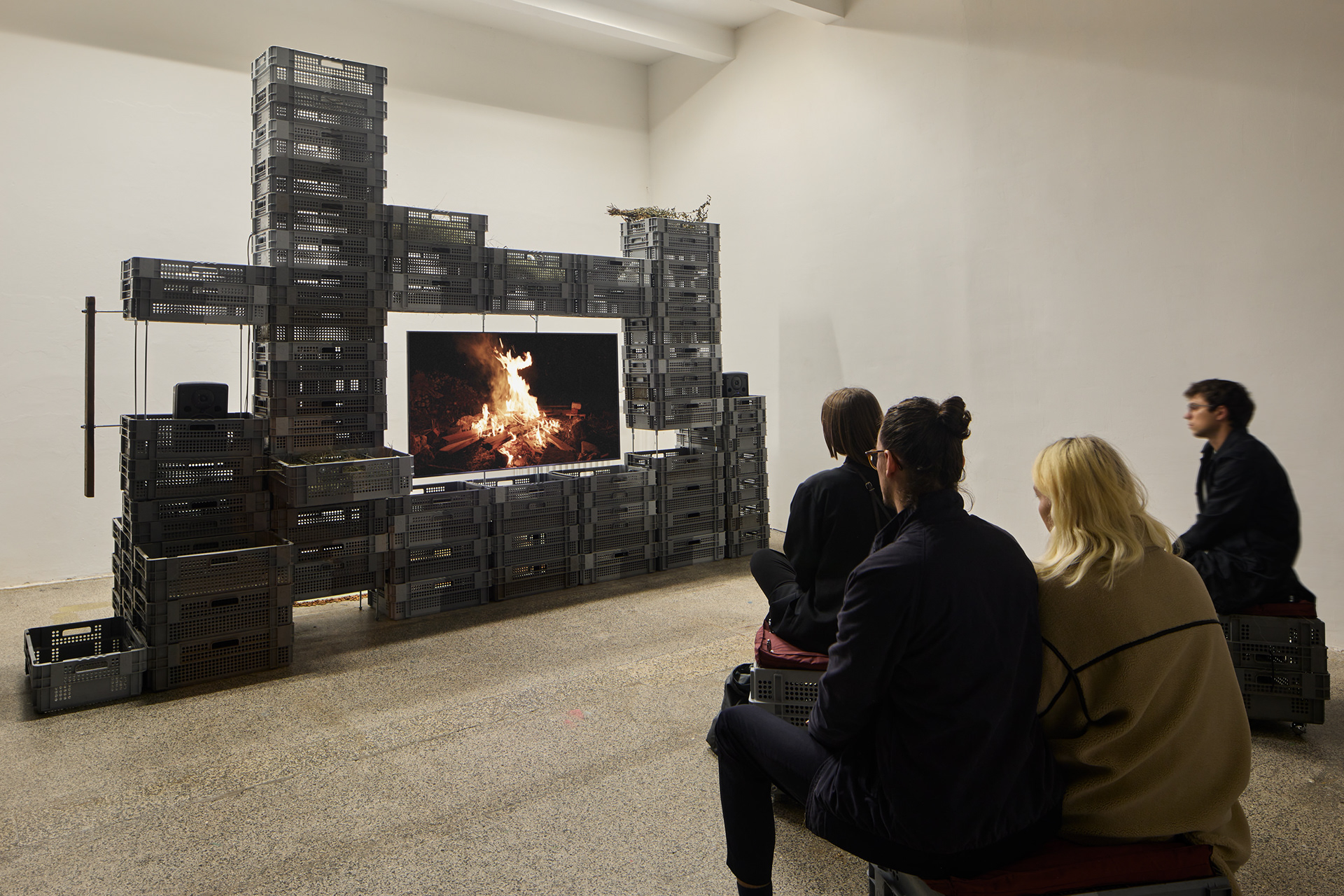
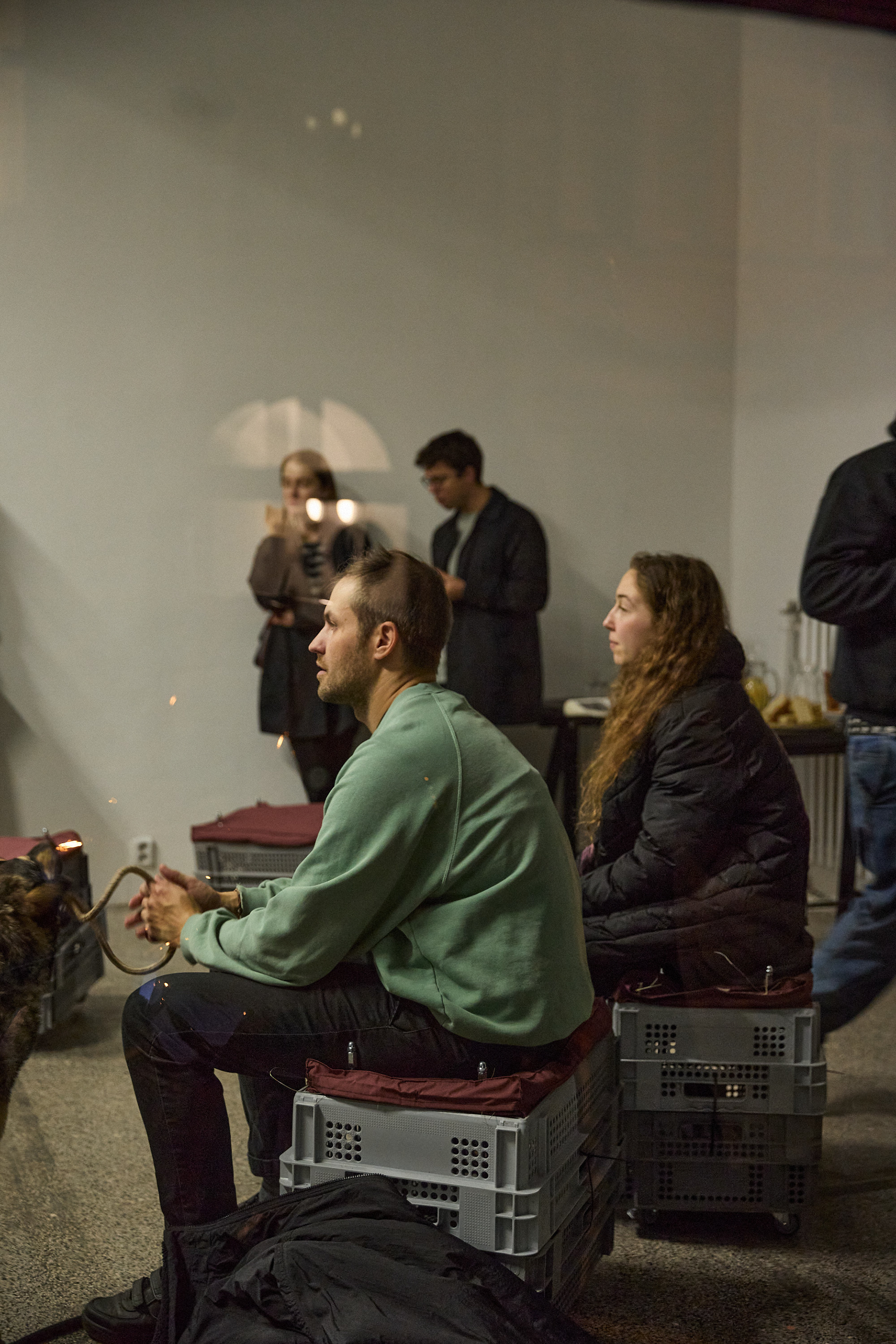
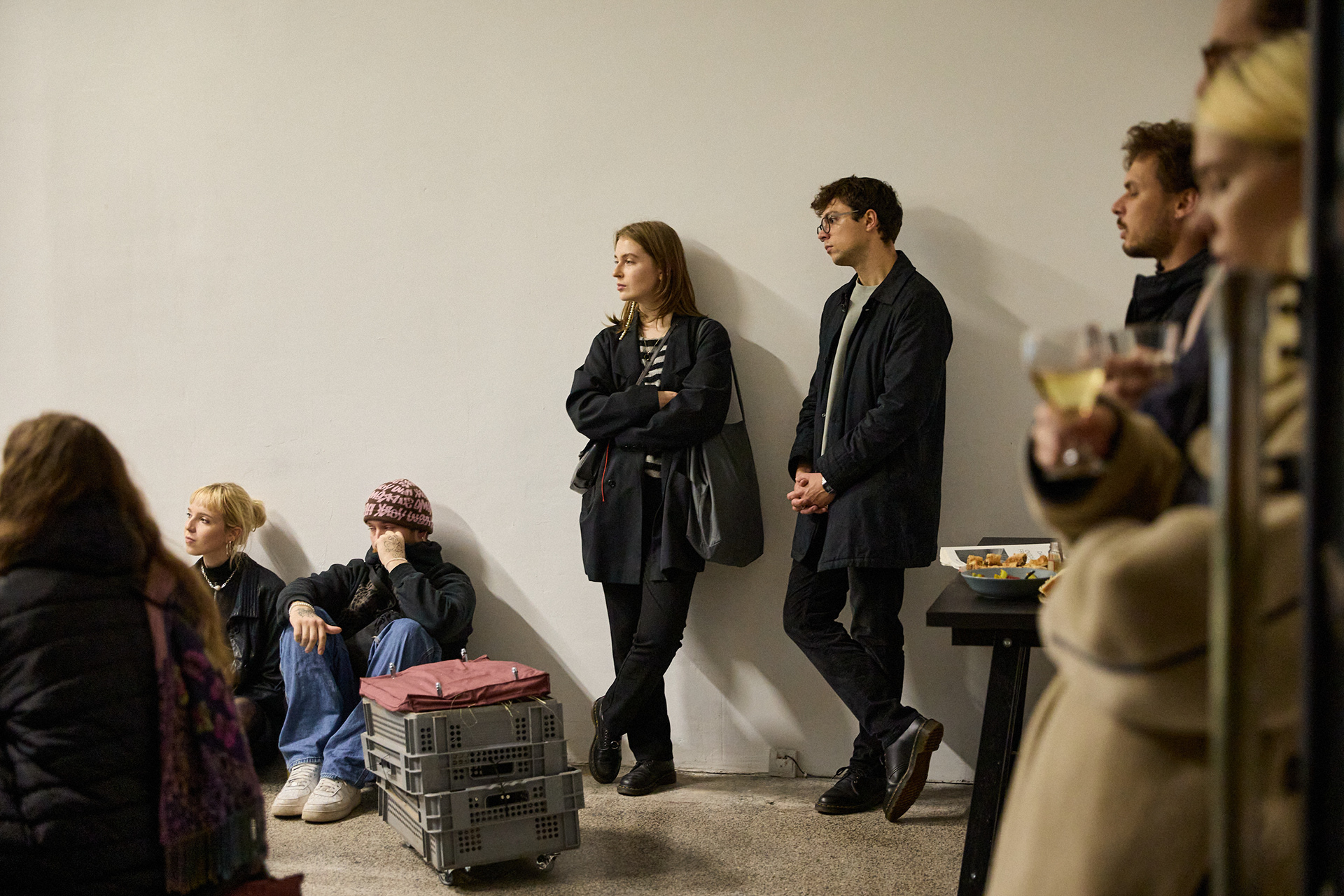


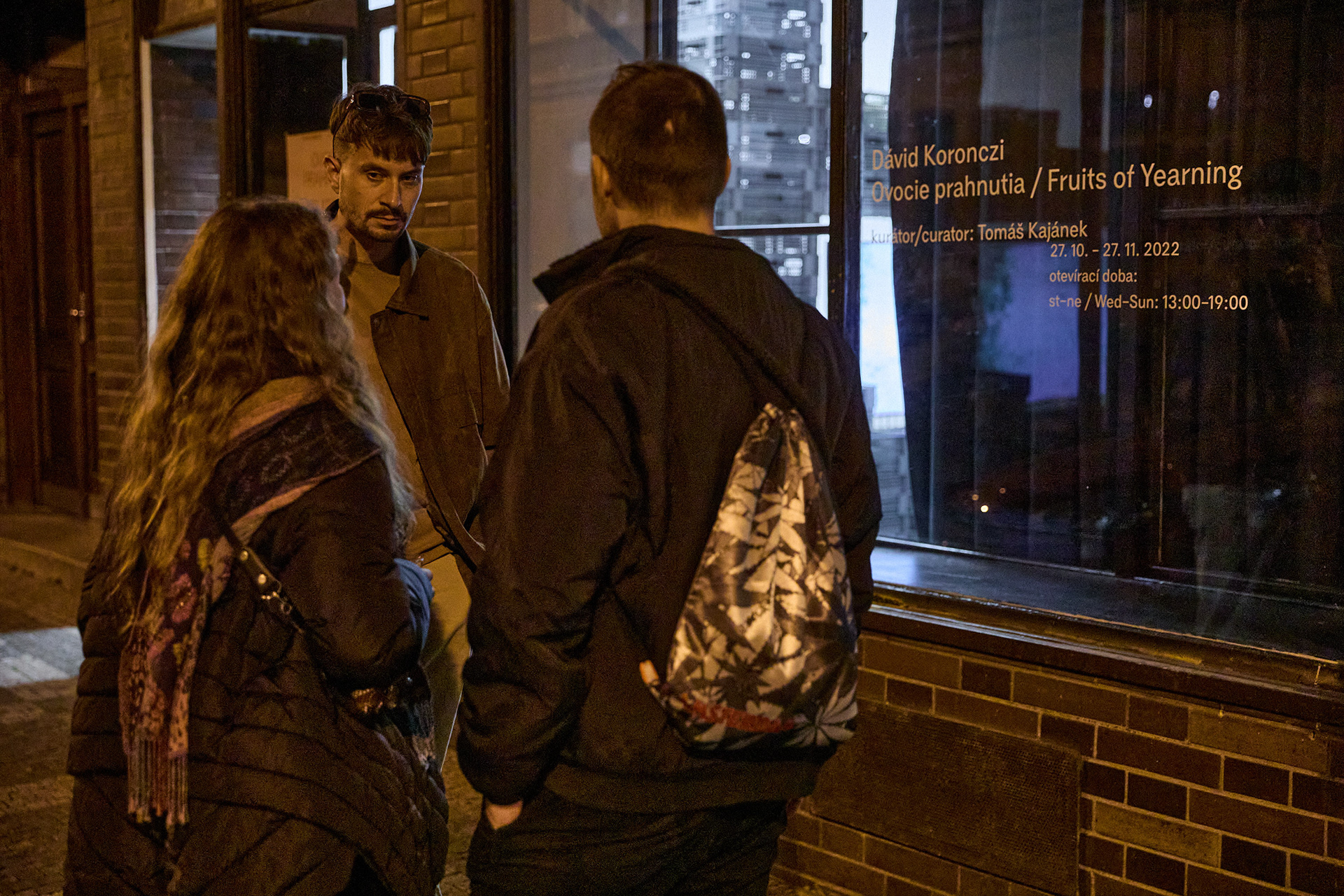


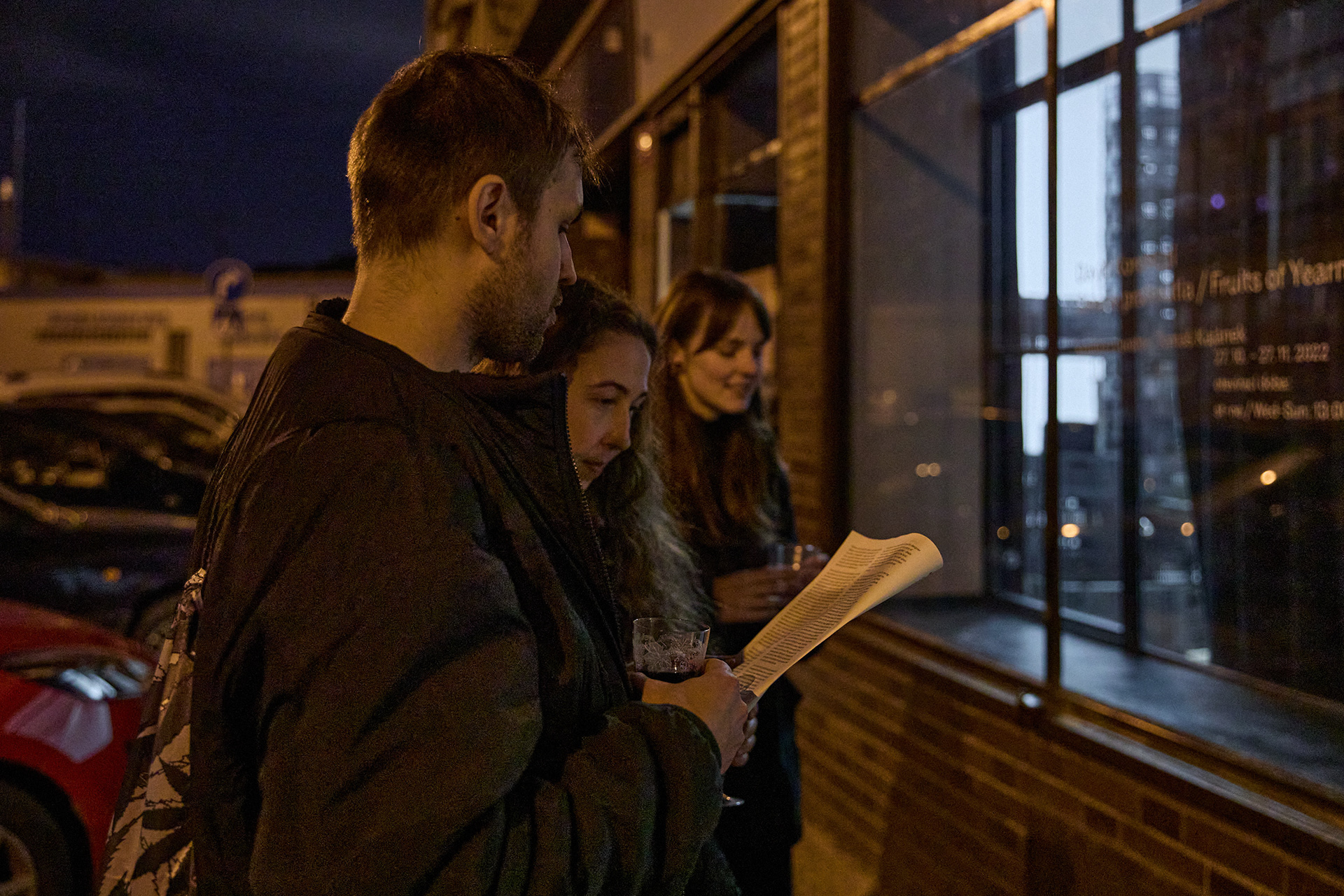
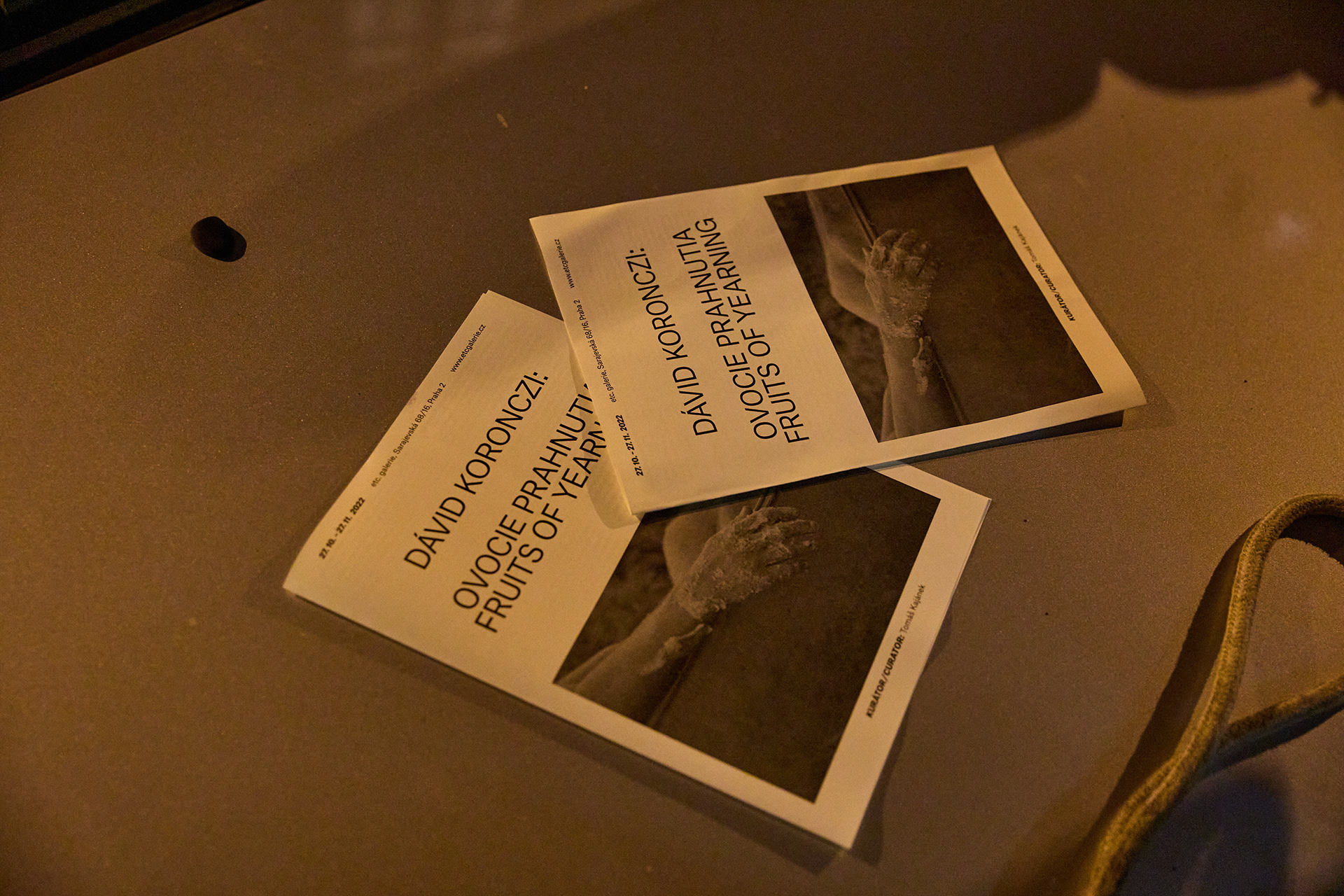
The exhibition by the audiovisual artist and graphic designer Dávid Koronczi is a multimedia work, which in a story of three protagonists – a mother, father and adult son – deals with the theme of fatherhood, our relationship to the land, the loss of roots and their re-establishment. This is set upon a backdrop of internal migration, gentrification of suburban satellites of the big city and the surrounding agricultural landscape.
The film in the video installation narrates the tale of a young man recent bereaved by the death of his father. Though he had not seen his father for many years, he decides to hold a wake for him. This decision is in conflict with the attitude of his mother, who, having endured a traumatic and toxic relationship with the young man’s father, is now at pains to erase him from her own life. The basic building block of the entire installation consists of Euro containers which the author obtained from a logistics firm. Their journey from a corporate haulage centre to a tranquil family garden mirrors the narrative of the story’s main protagonist. “If you can’t even put down your own roots, how the hell are you going to cultivate someone else?” stands upon an object produced from materials left over following the reconstruction of the artist’s house close to his hometown in central Slovakia, where the film was made and where he recently moved together with his family. Koronczi’s work, influenced by his own experience of fatherhood, deals not only with the need to seek out a positive masculine role model, but also evokes a desire for a relationship with the land, which he is attempting to reframe as a fatherland (otčina) while stripping it of the nationalistic pathos we hear in the venerated Vaterland of the Nazis or the patriotism of the Latin word for fatherland – patria. The yearning for a land is not determined by a sense of belonging to a national identity, but rather by the magnetic forces of proximity to one’s native land. When we speak of land, what we mean is dirt, rotten apples, fermenting plums, roots of plants and trees, millipedes, earthworms, larvae, communities of microorganisms, the decomposing bodies of our ancestors, ash, extending branches.
The film, which is rich in tactile and auditory sensations, full of kneading and cracking, shows us how our own body and mind consciously situate themselves within an ecology of relationships that transcend the binarity of family–friends, human–nonhuman, animate–inanimate. For Koronczi a symbol of understanding of inter-species relationships is bread, which represents a focal point for him throughout the whole of his oeuvre (we may recall for example the DP.OCH projects within the framework of the Oskár Čepan Award in 2019, or the Ventriloquing series of performance evenings). If we reach an awareness that when digesting food we are also consuming the ideological narratives that circulate around it, bread can then represent a kind of desire for a world in which we form an alliance of species of animals and plants, as well as inanimate nature. Bread is thus a part of the family.
...Tomáš Kajánek, curator
...
...
Credits (film):
Starring: Peter Oszlík
Screenplay and direction: Dávid Koronczi
Assistant director: Lýdia Ondrušová
Screenplay consultant: Peter Balko
Production assistant: Jaroslav Baláž
Camera and editing: Denis Kozerawski
Sound: Erik Pánči
Music: Erik Pánči a Jaroslav Baláž
Voice: Barbora Benková
Subtitles: Martin Makara, Zbyněk Grepl
Caterer: Viki Jakabová
Administration: Martina Szabóová (@martina_szaboova)
.
Credits (show):
Curator: Tomáš Kajánek
Production: Anna Davidová
Installation: Max Máslo, Jaroslav Baláž, Dávid Koronczi, Michal Cáb
Spedition Robert Halapín
.
Photo: Jan Kolský
Výstava audiovizuálního umělce a grafického designéra Dávida Koroncziho představí multimediální dílo, které na příběhu tří protagonistů – matky, otce a dospělého syna – pojednává o otcovství, vztahu k půdě, ztrátě kořenů a jejich opětovnému zapouštění. Na pozadí se práce dotýká vnitrostátní migrace a gentrifikace příměstských satelitů velkoměsta a okolní zemědělské krajiny.
Film ve videoinstalaci vypráví příběh mladého muže, který se po nedávné smrti svého otce, se kterým se již dlouhá léta nevídal, rozhodne uspořádat smuteční hostinu. Toto rozhodnutí je v rozporu s postojem jeho matky, která se otce po traumatickém a toxickém vztahu s ním snažila vymazat především ze svého vlastního života. Základní stavební jednotku celé instalace tvoří europřepravky, které autor získal od logistické firmy. Jejich cesta z korporátního spedičního centra do tiché rodinné zahrady kopíruje příběh hlavního představitele příběhu. „Když nedokážeš zakořenit sám, jak chceš sakra pěstovat někoho jiného?“ stojí na objektu vyrobeném z materiálů, které zbyly po rekonstrukci umělcova domu nedaleko rodného města na středním Slovensku, kde byl film natáčen a kam se autor s rodinou nedávno přestěhoval. Koroncziho práce ovlivněná vlastní otcovskou zkušeností není jen o potřebě hledání pozitivního maskulinního vzoru, ale také připomíná touhu po vztahu k zemi, kterou se jako otčinu snaží přerámovat a zbavit ji vlasteneckého patosu, který slyšíme z nacisty oblíbeného Vaterland, či patriotismu odvozeného z latinského slova pro otčinu – patria. Prahnutí po zemi není dáno příslušností k národní identitě, ale spíš přitažlivými silami své rodné země. Pokud píšeme zemi – myslíme tím hlínu, shnilá jablka, kvasící švestky, kořeny rostlin a stromů, mnohonožky, žížaly, larvy, společenstva mikroorganismů, tlející těla našich předků, popel, rozkládající se větve.
Film, který je bohatý na hmatové a sluchové vjemy, plný hnětení a praskání, nám ukazuje, jak se vlastní tělo i mysl vědomě zařazují do ekologie vztahů, překračující binaritu rodina–přátelé, člověk–ne-člověk, živé–neživé. Symbolem pro pochopení mezidruhových vztahů je pro Koroncziho chléb, kterému se věnuje skrze celou svou tvorbu (vzpomeňme např. na projekty DP.OCH v rámci Ceny Oskára Čepana roku 2019 či sérii performativních večeří Bruchovravy). Pokud si uvědomíme, že společně s trávením jídla konzumujeme i ideologické příběhy, které jídlo obepínají, může chleba představovat takovou touhu po světě, v kterém tvoříme spojenectví živočišných druhů s druhy rostlin a také neživou přírodou. Chleba je součástí rodiny.
Tomáš Kajánek, kurátor
...
...
Kredity (film):
V hlavnej úlohe: Peter Oszlík
Scenár a réžia: Dávid Koronczi
Asistentka réžie: Lýdia Ondrušová
Konzultant scenára: Peter Balko
Asistent výroby: Jaroslav Baláž
Kamera a strih: Denis Kozerawski
Zvuk: Erik Pánči
Hudba: Erik Pánči a Jaroslav Baláž
Spev: Barbora Benková
Titulky: Martin Makara, Zbyněk Grepl
Katering: Viki Jakabová
Administratíva: Martina Szabóová (@martina_szaboova)
.
Kredity (výstava):
Kurátor: Tomáš Kajánek
Produkcia: Anna Davidová
Inštalácia: Max Máslo, Jaroslav Baláž, Dávid Koronczi, Michal Cáb
Prevoz diel: Robert Halapín
.
Fotografie: Jan Kolský